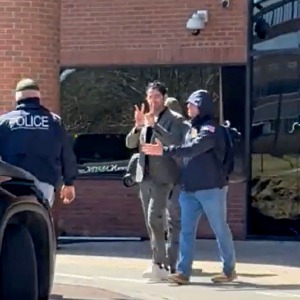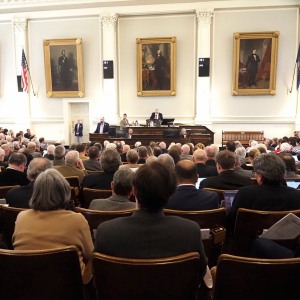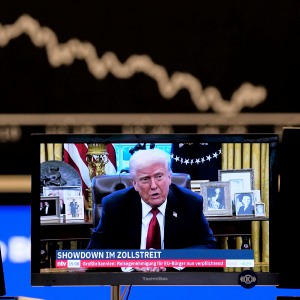By the Way: Reckoning with white evangelical racism

Randall Balmer. Copyright (c) Valley News. May not be reprinted or used online without permission. Send requests to permission@vnews.com.
| Published: 07-05-2024 9:01 PM |
As someone who was reared as an evangelical, I resisted for decades the charge that white evangelicals were racist. Sure, I knew about segregation academies and places like Bob Jones University, but I was also aware that many evangelical megachurches were more integrated than most mainline Protestant congregations.
The overwhelming — and enduring — white evangelical support for Donald Trump forced me to reconsider.
All of this was brought to mind by a post from my friend Jemar Tisby, an evangelical and author of “The Color of Compromise.” Tisby recently discovered Tom Skinner, who died 30 years ago. Tisby accurately describes Skinner as “a Black Christian who closely interacted with white evangelicals.”
Skinner, a former gang member who converted to evangelical Christianity, was a dynamic preacher, often described early in his career as the “Black Billy Graham,” a reference to the most popular evangelist of the twentieth century. He published two books, “Black and Free” and “How Black Is the Gospel?”
White evangelicals embraced him so long as he simply “preached the gospel” and foreswore issues of racial, social and economic justice.
Skinner delivered a memorable address to an evangelical missions conference in 1970. “Any gospel that does not talk about delivering to man a personal savior who will free him from the personal bondage of sin and grant him eternal life and does not at the same time speak to the issue of enslavement, does not speak to the issue of injustice, does not speak to the issue of inequality — any gospel that does not want to go where people are hungry and poverty-stricken and set them free in the name of Jesus Christ is not the gospel.”
That did not sit well with white evangelicals, who were largely apolitical at the time.
I encountered Skinner a couple of years later. In October 1972, I skipped mandatory chapel at my evangelical college and headed for Edman Chapel at Wheaton College in the leafy suburbs of Chicago. George McGovern, former Methodist seminary student, the Democratic senator from South Dakota and his party’s nominee for president, was the featured speaker.
Article continues after...
Yesterday's Most Read Articles
Tom Skinner introduced him, and when Skinner mentioned the social teachings of Jesus and how McGovern took those teachings seriously, Wheaton students, overwhelmingly white, booed him lustily.
I should have paid closer attention to that moment, to how Skinner, a Black evangelical, was treated that morning at Wheaton College.
White evangelicals, along with the rest of the nation, rejected McGovern in favor of Richard Nixon that November, although they had yet to organize politically. When they did so in advance of the 1980 presidential election, they spurned one of their own, Jimmy Carter, and stampeded toward Ronald Reagan and the far-right precincts of the Republican Party.
For decades, leaders of the Religious Right insisted that opposition to abortion had motivated their entry into politics. My own research proved otherwise.
Evangelicals considered abortion a Catholic issue until the late 1970s. Although the Southern Baptist Convention passed a resolution calling for the legalization of abortion in 1971, 1974 and 1976, most evangelicals were silent when the Roe v. Wade decision was handed down in 1973. The few evangelicals who weighed in applauded the ruling.
What catalyzed the Religious Right, I discovered, was not opposition to abortion; it was a defense of racial segregation at places like Bob Jones University and Jerry Falwell’s segregation academy in Virginia, Lynchburg Christian Academy.
As I argue in “Saving Faith: How American Christianity Can Reclaim Its Prophetic Voice,” unacknowledged racism tends to fester. The political movement born in defense of racial segregation and discrimination has proven remarkably responsive to the racist dog whistles — law and order, welfare queens, immigrant surges — of right-wing politicians.
Is it any wonder that 81% of white evangelicals supported Donald Trump in 2016 and a greater number four years later?
The line connecting the defense of racism in the 1970s to the adulation of Trump in the last decade was not a straight one — George W. Bush, despite his approval of torture and the debacle of Iraq and Afghanistan, had some good moments on matters of race — but white evangelical leaders have never acknowledged their complicity in abetting racism and politicians who traffic in racist rhetoric and policies.
Tom Skinner’s summons to racial justice in the 1970s fell on deaf ears. He was marginalized by white evangelicals at a time when his prophetic voice might have pointed them in a different direction from the course they chose.
Decades later, we are still dealing with the failure of white evangelicals to heed his prophetic voice.
Randall Balmer, author of “Bad Faith: Race and the Rise of the Religious Right,” teaches at Dartmouth College.






 Editorial: Vermont judge defends free speech
Editorial: Vermont judge defends free speech  Editorial: Free speech detentions reach into Upper Valley
Editorial: Free speech detentions reach into Upper Valley Editorial: New Hampshire budget shortfall is a crisis of Republican design
Editorial: New Hampshire budget shortfall is a crisis of Republican design Editorial: Time is running out for American democracy
Editorial: Time is running out for American democracy
